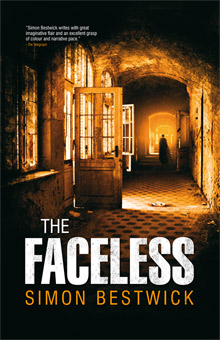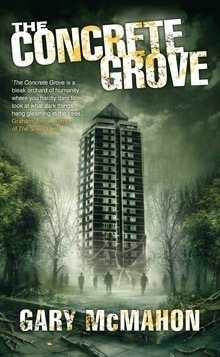Lets Drink To The Dead (12 page)

“Don’t be hasty. I can offer you much. Or I can withhold things you would rather not know.”
The glass fell free and shattered on the floor. Now she fumbled with the wheel, flicking at it again and again.
“I can see a great deal, Mrs Griffiths. I can see a long way ahead, further than any of you. Even you, with your little... Sight. I can see, for example, when your son will die. And how. It is a fixed event in time. A rock in the stream. Immutable. Nothing you can do will change it. I can see it and I can tell you how long he has left. How will you look at him, knowing that?”
He was playing for time. He had to die. She had to do it now. But those grey, colourless eyes held her, wouldn’t let her go. She flicked the wheel again; a flame bloomed.
The Shrike must have seen it. “Wait. There’s more. Your friend. The Pole.”
She touched the flame to the wick; after a slow, agonising moment, it bloomed into life.
“I can see his death very clearly too,” said the Shrike. “He has seven years of life left, Mrs Griffiths. He will die in 1993 from cancer, and he will suffer first. Even if you warned him now, you would never save him. His death is written. But it’s different from your son’s. I can save Bronisław. I can intervene. He will live a long life, as long as yours if not longer.”
One of the legs twitched.
Now. It had to be now. Myfanwy brought up the lamp to throw–
“Your granddaughter,” shouted the Shrike – was that fear in his voice, fear at last? “Your precious little Anna – I can see her death too.”
Myfanwy screamed then, to drown him out – she knew Anna would die one day but didn’t want to believe–
And suddenly the Shrike was surging to his feet, lunging for her. Time slowed; Myfanwy suddenly felt quite calm. She hurled the lamp; it hit him in the face and shattered into pieces, the fuel spilling over him, the glass shredding his face. The fuel ignited; orange flame rushed outwards, raced across his chest, along his arms, engulfed his face and head. He screamed and flailed but still he came at her.
Myfanwy still wasn’t afraid. She turned and stepped out of the door. “Bronisław,” she said, and stepped out of his line of fire. He was standing not ten feet from the door, the reloaded shotgun in his hands. He fired both barrels; the Shrike flew backward through the doorway with a screech, falling. The flames roared and spread; smoke began boiling out of the mill’s windows.
Bronisław stumbled away, sank to his knees. Wesley cradled Tammy as she sobbed. Myfanwy picked up the fallen branch and stood as close as she dared to the door, waiting, until the screeching finally died away and there was only the crackle of the flames.
13
J
UST BEFORE DARK,
Myfanwy pulled up outside the burned-out farmhouse on Dunwich Lane. She waited. She waited almost ten minutes, eyes straying over and over to the black, empty hole of the doorway, before getting out of the car and venturing inside.
The smell of wet earth, rotten wood and burning enfolded her. She shone her torch around the inside of the house, found only soot-blackened stone, puddles of rainwater and melted snow. Nothing else.
“Hello?” she called. No answer, of course. Foolish to ask. She could hear her own voice; there was none of the silence that came with the dead.
“Was that what you wanted?” she asked, but only the cold steady drip of water answered her, telling her nothing.
“He’s dead,” she said. “Was that what you wanted?”
No answer.
“The children are safe. Was that what you wanted?”
No answer.
“It’s over. Was that what you wanted? It’s over.”
No answer.
“Isn’t it?”
No answer.
There were no answers here, not now.
This earth is full of bones
, the girl had said. Perhaps. Perhaps it was. But in all other ways the house was empty. The children had gone.
She switched off the torch; the shadows rushed back in, reclaiming their own. This place belonged to the dark; always had. She turned and went back to the car.
C
HRISTMAS
E
VE AND
a whisper of snow blew down Rudgate Street, old brittle long-dead leaves skittering over the road and along the pavement. But that was outside. Inside the Creamery, at their table by the window, they sat warm and snug; an old woman and a man in his late fifties, sipping coffee and nibbling cake.
Bronisław had one arm in a sling; a bandage lay down the side of his face, where tinier, undressed cuts were healing.
“So,” she said, “you’re well?”
“Fine.”
“You should really still be in hospital.”
Bronisław scowled. “Rubbish. Just cuts and bruises. I will be fine.”
“Well, that’s good. Never forgive myself otherwise. Expect Roberta’d like to hang me up from a lamppost.”
He smiled. “A little.”
“And you?”
“We will always be friends, Myfanwy. But I think the next time you do something like this, you should ask someone else.”
“Oh.”
“It was not the danger. It was the memories. I was a soldier again. A taker of lives. I remember how I held other guns. How it felt. Power. Until you come to want to pull the trigger, to destroy. I would rather not be reminded of those times. They are gone.”
“I understand. Don’t worry – I don’t think there’ll be a next time. Not at my age. I doubt there’s much worse out there than the Shrike. Not that I could deal with, at least.”
“You’ve heard nothing more?”
“No.”
“The children?”
“They’ve gone on somewhere else. Better than here, I hope.”
“I meant Tammy and Wesley. They are well?”
“Yes. Back with their families. They’ll be alright. I hope. But they never found the briefcase, I’m guessing that had the money the Shrike was bringing, and there’s been nothing about the policeman who was working with him.”
“So he is still out there.”
“Yes. But at least the Shrike’s gone. You’d think that should count for something.”
“I hope so.” Bronisław glanced outside. “I had better go.”
“Alright.”
He stood. “Merry Christmas.”
“Merry Christmas, Bron.”
He went out and limped away through the falling snow, not looking back.
He couldn’t have heard what the Shrike had said inside the mill; at least, Myfanwy hoped not. If he had, perhaps he understood.
He has seven years of life left. He will die in 1993 from cancer, and he will suffer first.
She wanted to believe the Shrike had lied to her, but on some deep level she knew he hadn’t. She didn’t know if there was a pattern to life: sometimes she hoped it, sometimes she feared it. And she never knew, because no-one did.
Myfanwy covered her mouth and did not speak.
And outside, the wind blew the leaves and the snow down the street, and on into the year beyond.
So much to lose here – will it be better there?
Nobody knows – will there be tears
So we can be moved by some beautiful aria?
You will find out when you see God cry.
Bolesław Taborski, 1927-2010
For Anna Taborska
ACKNOWLEDGEMENTS
I would like to thank Halina Taborska for permission to quote Bolesław Taborski’s poem ‘A Fragment Of Being,’ Anna Taborska, Gary McMahon and Joel Lane for reading and commenting on earlier drafts of these stories, and Jonathan Oliver for publishing these tales. Thanks, folks.
ABOUT THE AUTHOR
Simon Bestwick
was born in 1974. His short fiction has popped up all over the place, in the UK and the States, and is collected in
A Hazy Shade of Winter
. His first novel,
Tomes of The Dead: Tide of Souls
, received wide critical praise and, more recently, he has been nominated for the Bram Stoker award.
Find out more about Simon at

A TOWN SHROUDED IN MIST. A BURIED SECRET TOO TERRIBLE TO TELL.
In the Lancashire town of Kempforth, people are vanishing. Mist hangs heavy in the streets, and in those mists move the masked figures the local kids call the Spindly Men. When two year old Roseanne Trevor disappears, Detective Chief Inspector Renwick vows to stop at nothing until she fi nds her. In Manchester, terrifying visions summon TV psychic Allen Cowell and his sister Vera back to the town they swore they’d left forever. And local historian Anna Mason pieces together a history of cruelty and exploitation almost beyond belief, born out of the horrors of war – while in the decaying corridors and lightless rooms of a long-abandoned hospital, something terrible is waiting for them all.
The Faceless
is a breathtaking tale of the supernatural, which will stay with you long after the last page has been turned.

www.solarisbooks.com

IT KNOWS WHERE YOU LIVE...
Imagine a place where all your nightmares become real. Dark urban streets where crime, debt and violence are not the only things to fear. Picture a housing project that is a gateway to somewhere else; a realm where ghosts and monsters stir hungrily in the shadows. Welcome to the Concrete Grove.
This deprived area is Hailey’s new home, but when an ancient entity notices her, it becomes something much more threatening. She is the only one who can help her mother as she joins in a dangerous dance with loanshark Monty Bright. Only Hailey can see the truth of Tom’s darkest desires as he tries to become part of their family. And only Hailey can lead them all to the heart of the estate where something older than this land stirs and begins to wake...
‘
The Concrete Grove
is McMahon’s most accomplished work to date. A compelling novel of extremes.’
Mark Morris, author of
The Deluge
‘There’s a new wave of brilliant horror writers, and McMahon’s right there at the top of them.’
Andy Remic, author of
Kell’s Legend
‘McMahon’s visionary sense of the supernatural makes
The Concrete Grove
one exciting read.’
Steve Rasnic Tem, co-author of
The Man on The Ceiling
